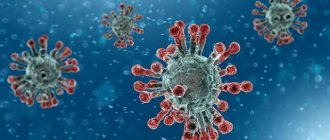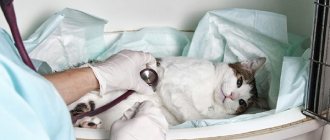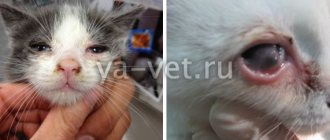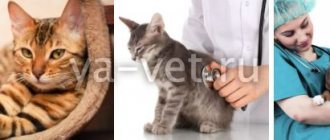Among the numerous diseases that attack furry pets, fatal ones are rare. With timely treatment, most diseases can be overcome. In recent decades, a serious, practically incurable pathology has appeared - FIP in cats. Read on to find out what this abbreviation means and what diagnostic methods exist.
Fip in cats: what is it?
FIP: General information about the disease
FIP disease in cats: what is it? This question arises for those owners whose pet has been diagnosed with this.
Feline infectious peritonitc is translated as infectious or viral peritonitis of representatives of the cat family. The suspected causative agent of this disease is the FECV coronavirus, which is considered relatively safe. Under certain conditions affecting the cat’s body, it begins to mutate. As a result, the virus leads to serious disorders in the animal’s body and its death. Scientists have still not been able to figure out how the disease develops, so diagnosing it in the early stages is almost impossible.
"Important information! According to veterinary statistics, FECV coronavirus was detected in 28% of cats living in groups and in 15% of pets living alone.”
Statistics make it clear that coronavirus in cats cannot be considered a rare phenomenon, but it should be noted that in 2% of cases it still leads to the development of FIP. Diseases of viral etiology are dangerous because infectious agents are very stable and can remain dormant for a long time.
Most often, the FIP virus in cats is diagnosed in kittens or adults under two or after ten years of age. Virological studies prove that the virus often affects animals with weakened immune systems.
Unfortunately, in 98% of cases, viral peritonitis is fatal. It is almost impossible to prevent infection with a deadly virus, since it is not known for certain what factor leads to its mutation.
Disease prevention
Since the disease is difficult to diagnose, it is difficult to prevent the spread of the virus. Experts highlight the following preventive measures for catteries and owners of domestic cats:
- Representatives of a sick litter should be castrated and removed from nurseries, that is, not sold.
- It is recommended to remove chronic carriers of enteritis from breeding, as well as susceptible lines.
- Regular disinfection of trays and areas where pets are kept is required.
- Avoid contact between pets and stray animals.
- Proper nutrition and proper living conditions.
- Hygiene.
A conscious approach to buying a pet also involves checking the documents and tests of the kitten’s parents.
Important! FIP is not transmitted from animals to humans, so isolating your pet if a coronavirus infection is detected is not required.
Methods of infection with coronavirus
It is generally accepted that animals that live in large groups on the street, at home or in nurseries are at greater risk. Some of them may be carriers of the virus and gradually infect other animals. Other cats can live with the virus for the rest of their lives, while in others the coronavirus mutates and leads to the development of infectious peritonitis. Most often, the disease is diagnosed in kittens aged from four months to six months.
It is very important to promptly determine the source of infection and do everything to prevent the spread of the disease.
An animal can become infected with FIP:
- in utero;
- during mating with an infected animal;
- by contact in contact with feces or saliva of a sick animal.
"Note! Carriers of FIP infection in cats often give birth to sick offspring that die before birth or after birth.”
But it also happens that several kittens survive and become carriers of the disease, infecting other animals. It is recommended to sterilize virus carriers and protect them from contact with relatives.
A relatively safe coronavirus can mutate due to:
- severe stress experienced by the animal;
- pregnancy;
- mating;
- genetic predisposition to viral peritonitis;
- weak immunity.
In the external environment, coronavirus can be destroyed by treating the room with detergents containing chlorine. By treating a room with a sick animal in this way every day, you can minimize the risk of infecting other cats.
The symptoms and treatment of FIP in cats can vary significantly. Everything will depend on the form of the disease, the general condition of the animal, its individual characteristics and immune system.
Popular myths about FIP
A rare but very dangerous disease causes panic among many pet owners. We wanted to address some of the misconceptions surrounding FIP.
Myth #1 Dewormers cause FIP
Some owners claim that after using anthelmintics, the cat fell ill with infectious peritonitis. Can anthelmintics cause FIP in cats? No, unless the animal is infected with coronavirus. Deterioration of the condition after taking anthelmintic drugs is possible only after an erroneous diagnosis. Many veterinarians have never encountered coronavirus infections, so certain symptoms are interpreted as helminthic infestations (the primary symptoms are indeed similar). In fact, the ward may be infected with coronavirus. Taking anthelmintics will only worsen the clinical picture of the disease.
Myth No. 2 You can get infected with FIP at an exhibition
It is not possible to become infected with FIP through short-term contact with someone who has the virus. The contact method of infection is less dangerous than the horizontal method (from female to kittens). In order for the coronavirus to penetrate the body of a healthy individual, it takes time and direct contact with waste products of the cat family (feces, urine, saliva).
Myth No. 3 Vaccination against FIP will protect your cat forever
The only live vaccine called PRIMUCELL is not 100% effective. It showed good results only for kittens (up to 4 months) that had not previously been infected with any strain of coronavirus. In other cases, the vaccine can create additional risks, worsening the patient’s health.
Experts around the world are desperately trying to find a cure for FIP in cats. Let's hope that they will be able to cope with this difficult task in the near future.
Forms of viral peritonitis
Viral peritonitis is divided into two types, each of which has its own symptoms, course and chances of cure. FIP happens:
- wet. The wet form of peritonitis is an acute type of pathology. During its development, the vascular system is damaged and protein leakage is observed, provoking the accumulation of transudate in the abdominal, pleural or pericardial cavity. This condition develops from two to four months and in 98% of cases ends in death for the animal.
- dry The dry form of FIP in cats is considered chronic and leads to the formation of plaques on internal organs. Diagnosed in animals with strong immunity. The severity of the development of the disease will depend on the organ in which the infectious process develops. The development of the disease lasts up to six months. Dry FIP in cats has a more favorable prognosis as it can be put into remission.
Most often, the wet form of the pathology is diagnosed. In veterinary practice, cases are sometimes recorded when two forms of the disease develop simultaneously.
When and how does FIP develop?
This directly depends on the strength of the animal’s cellular immunity.
- If the cat’s body is capable of a full-fledged immune response, then the multiplication of the virus in macrophages stops and the disease does not develop.
- If the virus “breaks through” cellular defenses and the body responds by intensively producing defective antibodies (not capable of completely neutralizing the virus), antigen-antibody complexes are formed, which are carried through the blood with macrophages. They are joined by complex blood proteins. All these complexes attach to the walls of blood vessels and stimulate the accumulation of neutrophils, which ultimately leads to damage to these walls. Protein fluid flows into the free body cavity. The result is a wet (effusion, effusion, exudative, ascites) form of peritonitis, which develops very quickly, the animal dies within a few weeks.
- If the immune response is weak, then a dry form of the disease develops: there are fewer infected macrophages in organ tissues, and the virus multiplies in them less intensively. The infection can last up to 6 months.
Sometimes, due to a sufficient immune response, the disease may recede for a while (giving false hope), but then reasserts itself.
It is not the virus that kills the cat, but the antibodies to it! This is such a paradox
Symptoms of viral peritonitis
Infectious peritonitis can occur in different ways in an animal. Everything will depend on the intensity of the pathology, the condition of the body and the age of the cat.
The incubation period for the development of the virus in the body can last from a couple of weeks to several months, depending on the number of viral agents and the state of the animal’s immune system.
Clinical signs of FIP in a cat can vary and depend on its form.
Symptoms of exudative viral peritonitis are presented:
- the presence of ascites;
- impaired respiratory function due to accumulation of exudate in the pleural cavity;
- fever;
- lethargy, lack of appetite, development of anorexia;
- renal failure, abnormalities in the functioning of the pancreas and liver;
- enlargement of mesenteric lymph nodes and liver borders;
- nausea and vomiting.
Symptoms of non-exudative viral peritonitis are presented:
- lack of appetite, anorexia;
- damage to the central nervous system, vestibular disorders, seizures, urinary incontinence, behavioral changes;
- eye nystagmus;
- enlargement of mesenteric lymph nodes and liver borders;
- formation of pyogranulomas in the kidneys;
- enlarged colon;
- bowel disorder.
Despite drug therapy, over time the animal begins to weaken, vitality fades, and ultimately death occurs. In rare cases, remission can be achieved. When diagnosing FIP, no veterinarian will guarantee a cat’s recovery, since in most cases, when this pathology is detected, death occurs.
Signs of FIP
In veterinary medicine, there are 2 types of FIP: wet and dry peritonitis. The complexity of the course of the disease largely depends not only on the above-mentioned root causes, but also on associated factors (bacterial infections, chronic diseases, method of treatment, and so on).
READ Flexoprofen for cats and dogs: instructions for use
Clinical symptoms of infectious peritonitis in cats:
- depressed state, painful appearance;
- partial loss of appetite;
- photophobia;
- changes in body temperature from high (over 40°C) to low (less than 38°C) and vice versa;
- vomit;
- prolonged diarrhea;
- labored breathing;
- bloating due to large accumulation of fluid in the abdomen;
- gradual or sudden weight loss (protruding ridge, thin paws);
- structural changes in the skin (dryness, yellowness, hair loss, scab formation);
- necrogranulomatous lymphadenitis;
- damage to the central nervous system (symptoms of rheumatism, meningitis, fearfulness, impaired coordination of movements).
Gradually the ward weakens, his vitality fades, and he dies. Unfortunately, no veterinarian can guarantee the recovery of a cat when diagnosed with infectious peritonitis.
Diagnosis of the disease
FIP is a difficult disease to diagnose. Since the diagnosis of FIP in cats at the initial stage is difficult to make due to the lack of specific symptoms, it is often confused with other pathologies. Wet peritonitis has a similar clinical picture with the bacterial form of the disease, renal ascites, heart failure and toxoplasmosis. And dry with lymphosarcoma and tuberculosis.
Pathology can be diagnosed by:
- blood test for FIP;
- X-ray;
- ultrasound examination of internal organs;
- biopsy of exudate or affected tissue.
The most reliable method is histology of the affected tissue structures. A general blood test has low information content, since it only allows you to determine the presence of antibodies to coronavirus, but it does not make it possible to recognize which strain has infected the animal. A positive result will confirm the presence of viral activity, but will not distinguish peritonitis from enteritis.
FIP treatment
Is there a cure for FIP in cats? It is difficult to answer this question. Long-term remission can be achieved, but in most cases the pathology is fatal. The disease cannot be cured, so veterinarians carry out supportive treatment, in which they prescribe drugs from various groups, including:
- antiviral;
- antibiotics;
- cardiotonics;
- immunostimulants;
- diuretics;
- corticosteroids;
- drugs that prevent potassium leaching;
- vitamins.
In severe cases, a blood transfusion is prescribed, and if fluid accumulates in the peritoneum or chest, it is pumped out. Pumping out the fluid is a temporary measure, since after some time it is collected again. With frequent pumping of exudate, potassium is washed out of the body, which causes irreparable harm to it.
In America, the dry form of viral peritonitis is successfully treated by administering special drugs to the animal. Russian veterinarians have invented the drug “Fosprenil,” which can induce remission and improve the condition of a sick animal.
It is introduced into the abdominal cavity after pumping out the fluid or using an oral or rectal form of administration. Two weeks after administration of the drug, cats experience progressive remission and vital signs stabilize. And in 5% of cases, animals recover completely. However, this drug does not help everyone, so often when a diagnosis of viral peritonitis is made, doctors recommend that the cat’s owner undergo euthanasia.
Treatment of infectious peritonitis in cats
Since the disease is very well “masked”, it is almost impossible to diagnose FIP without additional laboratory tests.
To do this, a biochemical blood test and examination of a fluid sample from the abdominal cavity are performed. In many cases, the final conclusion is made only posthumously after an autopsy. There is deformation and dystrophy of vital organs, white films on the liver, intestines, kidneys, the presence of a transparent jelly-like fluid in the abdomen, etc.
FIP is considered an incurable disease, so all actions are aimed at maintaining immune functions and fighting concomitant bacterial infections. Very often, veterinarians prescribe antibiotics and immunomodulatory drugs. In particularly severe cases, when treatment does not work, veterinarians offer euthanasia.
A vaccine against FIP called PRIMUCELL is available in the United States. However, clinical studies show mixed results, so it cannot be considered an effective drug for infectious peritonitis.
Preventive actions
Since scientists have not fully studied the mechanism of FIP infection, a vaccine against the disease has not yet been developed. There are drugs that can reduce the risk of coronavirus mutation.
For prevention purposes, veterinarians recommend providing your cat with a balanced diet, proper care, as well as timely vaccination and helminthization.











